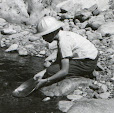From the Alaska Dispatch:
Miners from the Chicken area -- a gold mining town of just 17 full-time residents and dozens of seasonal miners off
the Taylor Highway, between Tok and the Canadian border -- said that
during the third week of August they were surprised by groups of four to
eight armed officers, who swarmed onto their mining claims with little
or no warning.
The officers were armed and wearing body
armor. They were part of the Alaska Environmental Crimes Task Force and
were there to check for violations of section 404 of the Clean Water
Act, according to several miners who were contacted by the group.
Section 404 governs water discharges into rivers, streams, lakes and
oceans.
The task force’s methods are now being questioned by the miners as well as the Alaska congressional delegation.
One of the questions that ought to be asked of these agencies is if they are intentionally trying to provoke a violent incident involving miners in service to some unacknowledged agenda?
You may read the entire article describing these disturbing events in detail at the link here.
Friday, September 6, 2013
Tuesday, September 3, 2013
Are We Recreational Miners? -- Not if We're Smart!
As readers of this blog have probably noticed, it is dedicated to the small-scale miner and prospector. There is a good reason to abide by this terminology, as illustrated in the following development reported on page 7 of the August issue of the Western Mining Alliance Newsletter.
It so happens that on August 28, Santa Barbara County Superior Court Judge Frank J. Ochoa denied the petition for an injunction to halt California's ban on suction dredging. According to the "Legal Update" printed in the newsletter, in order to obtain the injunction the miners needed to show, among other things, that they would be irreparably harmed by the ban. To quote from the article:
Judge Ochoa took the position we haven’t demonstrated sufficient harm to warrant an injunction. This ruling was based primarily on the 2009 Suction Dredge survey which the State presented as evidence.
The Suction Dredge Survey sent out in 2009 as part of the Environmental Impact Report had 668 people respond to it. Of that number 82% labeled themselves as recreational dredgers. (Emphasis added.)
This recreational dredging term resulted in the judge deciding a recreational activity couldn’t suffer irreparable harm and denying the injunction
While there is some room for hope in reversing this ruling in that it ignores the plight of the 18% of respondents to the Suction Dredge Survey who did not identify themselves as "recreational" dredgers and who may well qualify as suffering "sufficient harm" from the ban, the cautionary tale to be learned here is that we are professional or semi-professional miners who enrich ourselves through our mining activities which, enjoyable as they may at times be, are not "recreational" in nature. Given the court ruling cited above, we might do well to heed the advice in the WMA Newsletter and "strike the term 'recreational' from (our) vocabulary."
The Western Mining Alliance Newsletter is well worth reading. The current issue may be found on the organization's webpage here.
It so happens that on August 28, Santa Barbara County Superior Court Judge Frank J. Ochoa denied the petition for an injunction to halt California's ban on suction dredging. According to the "Legal Update" printed in the newsletter, in order to obtain the injunction the miners needed to show, among other things, that they would be irreparably harmed by the ban. To quote from the article:
Judge Ochoa took the position we haven’t demonstrated sufficient harm to warrant an injunction. This ruling was based primarily on the 2009 Suction Dredge survey which the State presented as evidence.
The Suction Dredge Survey sent out in 2009 as part of the Environmental Impact Report had 668 people respond to it. Of that number 82% labeled themselves as recreational dredgers. (Emphasis added.)
This recreational dredging term resulted in the judge deciding a recreational activity couldn’t suffer irreparable harm and denying the injunction
While there is some room for hope in reversing this ruling in that it ignores the plight of the 18% of respondents to the Suction Dredge Survey who did not identify themselves as "recreational" dredgers and who may well qualify as suffering "sufficient harm" from the ban, the cautionary tale to be learned here is that we are professional or semi-professional miners who enrich ourselves through our mining activities which, enjoyable as they may at times be, are not "recreational" in nature. Given the court ruling cited above, we might do well to heed the advice in the WMA Newsletter and "strike the term 'recreational' from (our) vocabulary."
The Western Mining Alliance Newsletter is well worth reading. The current issue may be found on the organization's webpage here.
Subscribe to:
Comments (Atom)
